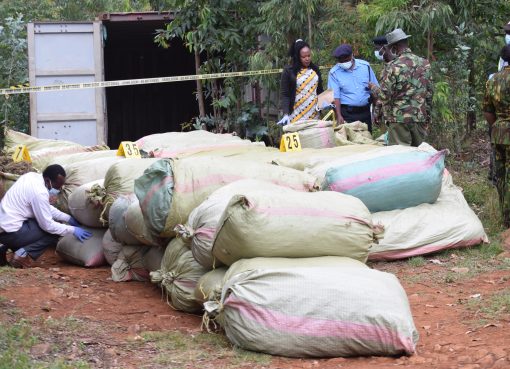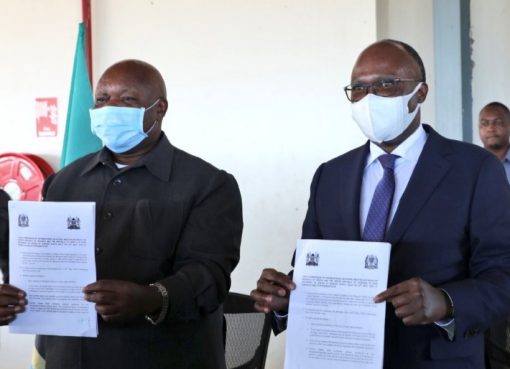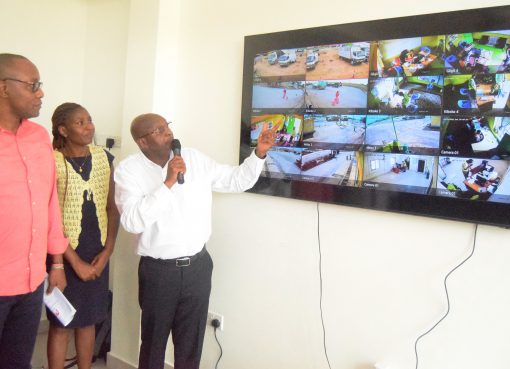Naromoru girls secondary school in Nyeri county has joined the growing list of learning institutions in the country that have embraced clean cooking energy solutions.
This follows the commissioning of a 2,000-kilogram capacity Liquified Petroleum Gas(LPG) kitchen in the school.
The initiative which was jointly funded by the State Department for Energy, the United Nations Development Programme, the Embassy of Japan and Community Road Empowerment will now see the school shift from the use of firewood to LPG as its main source cooking fuel.
Speaking during the official opening of the kitchen on Friday, Energy Principal Secretary, Alex Wachira, said that the school is one beneficiaries of the Accelerating Clean Cooking Access(ACCA) project.
Wachira revealed that similar facilities had been installed in four other schools in Nairobi, Kajiado, Tana River and Machakos counties with the main goal of the state department being to champion for the use clean cooking solutions before the year 2028.
“As a country we have an obligation of accelerating clean cooking and we want to attain this goal by 2028.This school for instance has been using wood fuel so as they plant trees they have also been cutting them down to provide wood fuel,” he said.
“The launch of this project means that this school will now be using LPG which clean energy and it will provide a benchmark for transforming the cooking practices in Kenyan institutions through improved efficiency which also promotes healthy surroundings,” added the PS.
During the launch, the school received the first consignment of the 2,000 kilos of LPG gas for free which is expected to last throughout the entire term.
While drumming up support for the use of clean energy alternatives, Wachira noted that only 30 per cent of households in the country are using clean cooking energy.
He said that the ACCA project, which was launched in July last year, is targeting close to 59 per cent of households and institutions in the country that are still using solid biomass fuels namely charcoal and wood.
Additionally, he noted that increased demand for fuel alternatives such as LPG gas, would eventually result in reduced prices of the commodity.
The average cost of refilling a 13 kilogram LPG cylinder is Sh 3,200 whereas that of six kilogram is Sh 1300.For one to refill a 3 kilogram LPG cylinder, they will have to part with Sh 980 putting the cost of a kilogram of LPG at an average of between Sh 250-300.
“It is our hope that we can accelerate clean cooking in our institutions and increase the uptake of LPG so that Kenyans can begin to enjoy the economies of scale. That way, the price of LPG will come down,” said Wachira.
The school principal, Esther Karira said that embracing LPG for cooking would help them combat some of the health risks associated with wood fuels.
She said the new project will save the institution some of the money that was previously spent in the purchase of firewood.
“A smokeless kitchen and dining hall will keep our students and staff safe from respiratory diseases caused by smoke.
The school will also be able to provide properly cooked meals at the right time, therefore there will be effective management of the school programme,” said Karira.
The PS was accompanied by Nyeri governor, Mutahi Kahiga and Kieni Member of Parliament, Njoroge Wainaina. Also in attendance were Central Region Director of Education, Sabina Aroni, the UNDP Deputy Resident Representative Madelena Monaja and the representative of the ambassador of Japan to Kenya, Nishimura Masaya.
In a message read on his behalf by Nishimura Masaya, the Japan ambassador, Ken Okaniwa pledged to continue supporting Kenya’s climate change counter measures by contributing to the Green Climate Fund.
The envoy noted that Japan had set aside US dollars 1.3 million towards promotion of clean cooking in Kenya as well as supporting the government realize its goal of achieving carbon neutrality by the year 2050.
“We hope that the installation of the modern clean cookers will contribute to Kenya’s Climate change counter measures and also improve the health of the people,” said the ambassador.
By Wangari Mwangi





